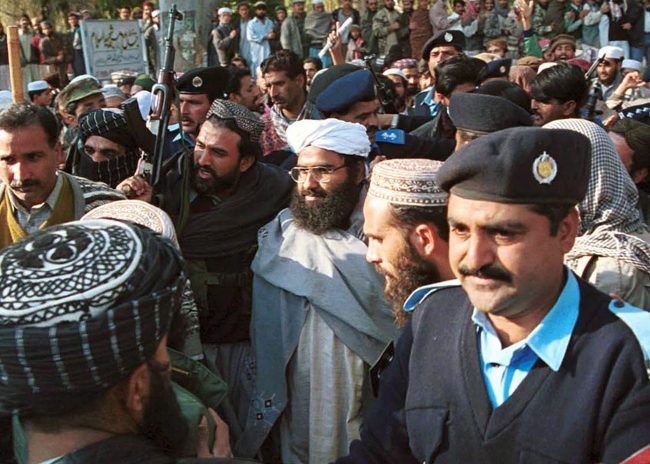Pakistan’s foreign affairs minister has appeared to admit that his government is in contact with Jaish-e-Mohammed, the terrorist group that claimed responsibility for the killing of 40 Indian troops in a suicide bombing in the disputed region of Kashmir two weeks ago.

The attack inflamed tensions between the two nuclear-armed rivals, with India long accusing Pakistan’s intelligence agency of nurturing Jaish-e-Mohammed and other militant groups.
Pakistan has denied any involvement in the attack and called on the Indian government to present evidence of Jaish-e-Mohammed’s role.
READ MORE: 6 civilians and 2 Pakistani troops killed in Kashmir shelling, officials say
In an interview with the BBC on Friday, Shah Mehmood Qureshi said there was “confusion” over Jaish-e-Mohammed’s involvement in the attack, despite the Pakistan-based group claiming responsibility on its media channels.
Asked who the leadership of the terrorist group was contacted by, Qureshi replied: “By, you know, by people over here. They say they deny, they deny, that’s the confusion.”
Pressed on who in Pakistan contacted the terrorist group, the minister said: “The people, the people who are known to them.”
WATCH: India says return of pilot is part of ‘convention’, Pakistan calls it a ‘peace gesture’

Qureshi’s remarks came a day after he told CNN that Jaish-e-Mohammed’s chief Masood Azhar is in Pakistan and bedridden due to illness. He said he had no other information on the 50-year-old militant leader.
Indian security officials believe Azhar is suffering from renal failure and receiving dialysis at a Pakistani military hospital, Indian media reported. Pakistani officials haven’t commented on that allegation.

Get breaking National news
Who are Jaish-e-Mohammed and leader Masood Azhar?
Jaish-e-Mohammed were founded in 2000 by Azhar after he was released from an Indian prison in exchange for 155 hostages from an Indian Airlines plane.
The hostage crisis lasted several days, with Indian authorities agreeing to release Azhar after the hijackers slit a passenger’s throat and threatened to kill more.
Days after his release, Azhar held a rally for some 10,000 supporters in the Pakistani city of Karachi, and called for the destruction of India and the U.S.

Jaish-e-Mohammed, whose aim is to bring all of Kashmir under Pakistani control, was involved in a 2001 attack on the Indian parliament building in New Delhi, in which nine Indians were killed.
It was also linked with the kidnapping and murder of American journalist Daniel Pearl in 2002.
READ MORE: Why India and Pakistan benefit from a ‘violent peace’ and the threat of war
JeM, as the group is commonly known, is classified as a terrorist group in several countries including the U.S. and Canada. But Indian and American authorities say it still operates openly in Pakistan.
The group has claimed responsibility for numerous suicide bombings in Kashmir, with Azhar boasting in 2014 that he had some 300 suicide bombers at his command.
WATCH: Suicide car bomber kills at least 30 police officers in Indian Kashmir

India has repeatedly tried to have Azhar designated a global terrorist by the United Nations Security Council, but China, a close ally of Pakistan, has blocked the measure for nearly a decade.
Last week, the U.S., U.K. and France moved a fresh Security Council measure to designate Azhar a terrorist.
Beijing backed the Security Council’s statement condemning JeM for the attack, but it hasn’t indicated whether it will change its stance on Azhar’s designation.
— With files from the Associated Press








Comments